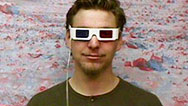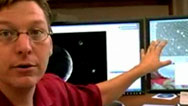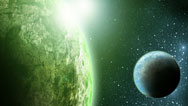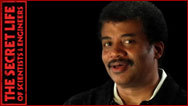10th Planet
- Posted 01.10.06
- NOVA scienceNOW
(This video is no longer available for streaming.) In 2005, astronomer Mike Brown and his team at Caltech discovered a new planet out beyond Neptune. Slightly larger than Pluto, the new object was nicknamed Xena (after the TV show "Xena: The Warrior Princess"). But is Xena a planet? For that matter, is Pluto a planet? Brown's discovery sparks a controversy over what exactly is meant by planethood.
Transcript
10TH PLANET
PBS Airdate: January 10, 2006
ROBERT KRULWICH: Big news in the neighborhood. This is our solar system. And a couple of years ago, almost everybody would have told you that orbiting our Sun you would find one, two, three, four, five, six, seven, eight, nine planets; but, as of this past year, we've got a tenth. Or do we?
MIKE BROWN: This will absolutely rewrite the "History of Astronomy" textbooks. There is now a tenth planet out there.
ROBERT KRULWICH: When Mike Brown and his team at Caltech announced they'd discovered what looked like a new planet, they did not give it a name. Names are bestowed by an international commission of scientists. So, in the meantime, since they were looking at this little bright light for more than year, they gave it a nickname.
MIKE BROWN: It had no name at all, so we had to call it something, so when we talked to each other we'd know what we were talking about. So we always give things code names, nicknames, and this one we codenamed Xena.
ROBERT KRULWICH: From...?
MIKE BROWN: From, of course, the TV show, Xena, Warrior Princess.
Of course, Xena has a satellite, which we had no choice but to call Gabrielle, which is Xena's sidekick in the TV show.
ROBERT KRULWICH: No choice?
MIKE BROWN: No choice.
ROBERT KRULWICH: But in proper scientific circles, when scientists talk about this object they use...
MIKE BROWN: ...the very unwieldy 2003UB313.
ROBERT KRULWICH: And it will stay 2003UB313 until the International Astronomical Union officially decides that this is, indeed, a planet—which by the way, they have not done. They're not even close.
MIKE BROWN: We're in committee limbo, international committee limbo, which is about the worst possible place you could imagine being.
ROBERT KRULWICH: But what exactly is the problem? It looks like a planet. I mean, it's round; planets are round.
MIKE BROWN: Nothing's really round. The Earth has got a bulge in it, and Saturn is actually quite squashed.
ROBERT KRULWICH: Okay, but Xena's round enough; and it's got a moon, which is very planet like; and it orbits the sun. But it turns out, this matter is still debatable because there's no precise scientific definition for "planet," and there hasn't been one for a long time.
NEIL deGRASSE TYSON: Did you know that in 1801 a new planet was discovered orbiting between Mars and Jupiter?
ROBERT KRULWICH: Neil deGrasse Tyson is director of New York's Hayden Planetarium.
NEIL deGRASSE TYSON: They called it Ceres. And they looked some more, and they found another planet, and another and another. The count of planets in the early 1800s was greater than it is today, thirteen planets in the solar system. And they kept looking, and the numbers kept growing. And they were running out of names, and they realized that, rather than counting new planets, they had discovered a new swath of real estate in the solar system called the asteroid belt.
ROBERT KRULWICH: So Ceres became an unplanet, and was re-designated to a new class. And it became the biggest asteroid.
NEIL deGRASSE TYSON: So we've been there before. We know how to demote something.
ROBERT KRULWICH: And that's exactly what he did to Pluto. When the Hayden Planetarium reopened in the year 2000, Neil Tyson decided to de-planetize Pluto. "In our opinion," he said, "Pluto is now an icy object that's different from the other planets."
NEIL deGRASSE TYSON: It's got enough ice, so that if you were to take Pluto and transport it to where Earth is right now, the heat from the Sun would evaporate the ice and it would grow a tail. And that's just no kind of behavior for a planet. We have words for things with tails, they're called comets.
ROBERT KRULWICH: Same for Xena, another icy body that lives in the Kuiper Belt out beyond Neptune. But a lot of people simply ignored Neil Tyson and the Hayden Planetarium and stuck with the list they'd learned in school. Remember those planets in the right order? Mercury, Venus, Earth, Mars, Jupiter, Saturn, Uranus, Neptune and Pluto.
NEIL deGRASSE TYSON: My very educated mother just served us nine pizzas.
MIKE BROWN: Martha visits every, Martha visits every Monday—must be for Mars—and just stays until noon, period. So there are two stupid things there. There's an "and" which is dumb, except the "and" is right where the asteroid belt is. I don't know if that's an accident or not. And then, I remember at the time, being in third grade, thinking that there's something funny about Pluto if it's really just a period at the end of a sentence.
ROBERT KRULWICH: Sophisticated scientists and ordinary folks can't seem to get together on this one. And Mike Brown, even though he discovered what could be the tenth planet, has this advice for the scientists:
MIKE BROWN: What I favor is the "give up" approach, which is to say, the word planet is not scientific, and it doesn't need to be. And as astronomers, we just need to get over it.
NEIL deGRASSE TYSON: These are the Pluto files, okay? This is hate mail that I've gotten from elementary school children. Handwritten letters saying, "Please, Dr. Tyson, what are you doing with Pluto? What? That's our favorite planet!"
"You are missing Pluto. Please make a model of it. This is what it looks like. It is a planet. Turn to the other page. A picture of Pluto."
"Dear Dr. Tyson, I think that Pluto is a planet for a lot of reasons, but you treat it like nothing! So if you can, please leave it a planet. And if you don't, then I say it is. And have a good day."
Credits
10th Planet
- Executive Producer
- Samuel Fine
- Executive Editor
- Robert Krulwich
- Senior Series Producer
- Vincent Liota
- Senior Producer
- Robe Imbriano
- Producers
- Julia Cort
Carla Denly
Robe Imbriano
Dean Irwin
Vincent Liota
Mary Robertson
Win Rosenfeld - Editors
- Ben Ehrlich
Nathan Hendrie
Robe Imbriano
Vincent Liota
Win Rosenfeld - Supervising Producer
- Andrea Cross
- Development Producer
- Kyla Dunn
- Program Editor
- Steve Trevisan
- Associate Producers
-
Anthony Manupelli
Mary Robertson
Win Rosenfeld
Ayo Babatunde
Shimona Shahi - Unit Manager
- Candace White
- Production Secretary
- Ayo Babatunde
- Compositing
- Yunsik Noh
- Production Assistant
- Robbie Gemmel
- Music
- Rob Morsberger
- NOVA scienceNOW Series Animation
- Edgeworx
- Camera
- Chris Borghesani
George Delgado
Brian Dowley
Tom Fahey
Vikram Gandhi
Robert Hanna
Michael Hunkley - Sound Recordists
- Paul Austin
Vikram Gandhi
Mike Karas
Dennis McCarthy
Gilles Morin
Alex Sullivan - Audio Mix
- John Jenkins
- Animation
- Mitch Butler
Edgeworx
Picket Design
Pie Design - Special Thanks
- Clifford Cunningham
Foxwoods Resort Casino
The Graduate Center at CUNY
Alex Meissner
Naturally Tasty Health Food
The New York Number Theory Seminar
The officers and crew of the NOAA ships Delaware II and Albatross IV
Jí¡nos Pintz
Salon Mario Russo
Cem Yildirim
Adam Zoghlin - Archival Material
- ABC News Video Source
Art. Lebedev Studio
Mike Brown, Caltech
Michael Brumlik
Jewel Webb Chambers
CNN
CORBIS Motion
Michael DiGiorgio, Worldwide Nature Artists Group
Denis Finnin, American Museum of Natural History
Richard Gibbe
Dennis Kunkel Microscopy, Inc.
Robert Hurt (IPAC)
Jupiterimages Corporation
The Macaulay Library at the Cornell Lab of Ornithology
MODIS Rapid Response Project at NASA/GSF
Museum of Comparative Zoology, Harvard University
NASA/JPL
NASA/JPL-Caltech
Jay Pitocchelli
Prairie Pictures / StormStock, Martin Lisius
24 Images
N. John Schmitt
Ultimate Chase Stock Video
Mitch Waite
WWL-TV - NOVA Series Graphics
- yU + co.
- NOVA Theme Music
- Walter
Werzowa
John Luker
Musikvergnuegen, Inc. - Additional NOVA Theme Music
- Ray Loring
- Post Production Online Editor
- Spencer Gentry
- Closed Captioning
- The Caption Center
- NOVA Administrator
- Dara Bourne
- Publicity
- Eileen Campion
Olivia Wong - Senior Researcher
- Barbara Moran
- Production Coordinator
- Linda Callahan
- Unit Managers
- Lola
Norman-Salako
Carla Raimer - Paralegal
- Richard Parr
- Legal Counsel
- Susan Rosen Shishko
- Post Production Assistant
- Alex Kreuter
- Associate Producer, Post Production
- Patrick Carey
- Post Production Supervisor
- Regina O'Toole
- Post Production Editor
- Rebecca Nieto
- Post Production Manager
- Nathan Gunner
- Supervising Producer
- Stephen Sweigart
- Producer, Special Projects
- Susanne Simpson
- Coordinating Producer
- Laurie Cahalane
- Senior Science Editor
- Evan Hadingham
- Senior Series Producer
- Melanie Wallace
- Managing Director
- Alan Ritsko
- Senior Executive Producer
- Paula S. Apsell
NOVA scienceNOW is a trademark of the WGBH Educational Foundation
This material is based upon work supported by the National Science Foundation under Grant No. 0229297. Any opinions, findings, and conclusions or recommendations expressed in this material are those of the author(s) and do not necessarily reflect the views of the National Science Foundation.
© 2006 WGBH Educational Foundation
All rights reserved
- Image credit: (Sedna) Courtesy NASA
Participants
- Michael Brown
- Geology and Planetary Science professor, Caltech
- Neil deGrasse Tyson
- Astrophysicist, American Museum of Natural History www.haydenplanetarium.org/tyson/profile/bio
Related Links
-

10th Planet: Expert Q&A
Astronomer Michael Brown of Caltech answers questions about the 10th planet.
-

Found It!
Michael Brown knew instantly the object he discovered in 2005 was a planet. In this video clip, he explains how.
-

Hunt for Alien Earths
Astronomers may be on the brink of finding Earth-like planets beyond our solar system.
-

What's Your Favorite Planet?
Listen in as 11 planetary scientists make pitches for the "best" planet, then vote yourself.
-

The Secret Life of Neil Tyson
An astrophysicist and cosmic fashion icon, Neil deGrasse Tyson explains his passion for space science and ties.
-

What Is a Planet?
This video presents the ongoing debate over the definition of a planet, including the status of Pluto.



